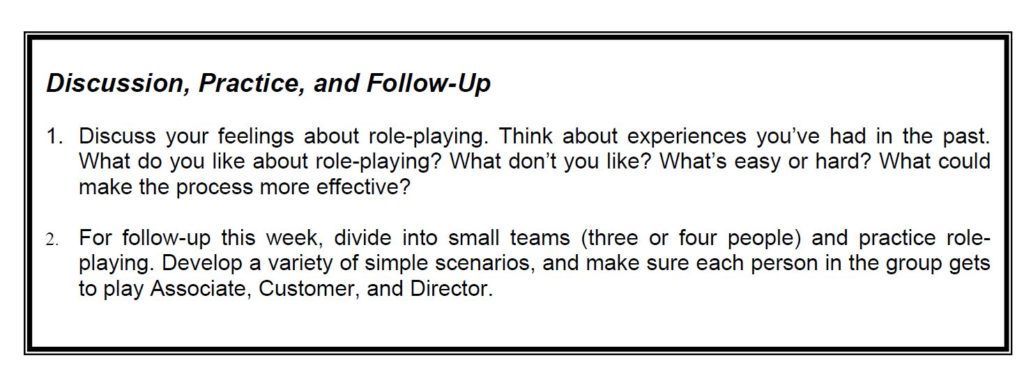Role-Playing to Build Selling Skills
Article provided for The Plumb Club by Kate Peterson, PC Performance Concepts

Role-playing is a proven training technique that’s based on natural human behavior.
If you’ve ever mentally rehearsed what you were going say or do in a situation, you’ve taken a step toward role-playing. To complete the process, you only need to involve a few more people and act out the scene. This ups the reality factor, gives you a better picture of how you’re doing, and boosts your chances of success.
Here are some ways in which role-playing can help you build your selling skills:
- Turning knowledge into experience—Someone can tell you how to sell a diamond (for example), but the instructions are likely to remain abstract until you actually work through the steps.
- Learning from the successes and mistakes of others—It’s often easier to understand what does or doesn’t work when you stand back and watch someone else in action.
- Trying out new techniques—Experimenting in a safe and supportive setting (in other words, practicing on coworkers) is a lot better than doing test runs in real presentations, where you might lose customers as well as sales.
- Working in new information—With the continual learning that’s part of true jewelry professionalism, you probably acquire fresh facts almost every day. But it takes practice to make these a comfortable part of your information reserve.
- Developing a feel for “real-life” give and take—Interactions with customers are never as simple as they sound in meetings or training sessions. So, it’s crucial to develop the ability to deal with whatever might come up when you’re face-to-face with another human being.
Many people are intimidated by the thought of role-playing. But once you get started your comfort level quickly rises. You also begin to see the benefits, and the process can even become fun. Until then, you need to find ways to make role-playing exercises as easy and effective as possible.
These include:
- Getting everyone on the team involved in some way, even if at first it’s only observing and offering comments.
- Starting with more experienced team members as the actors, so others can see how it’s done before attempting it themselves.
- Finding the right size for role-playing groups. Since large audiences can be daunting, you might try working in smaller teams. (The minimum is three people—two to act and one to direct.)
- Staying focused. Remember that roleplaying’s goal is to improve specific skills through controlled practice. To do this you need to define the situation as specifically as possible. For instance, instead of trying to role-play the entire selling process from start to finish, it’s better to work on
individual steps.

Kate Peterson
No matter how much role-playing you’ve done, or what the topic, the process breaks down into a few basic steps. First comes the introduction or warm-up—and this is crucial. Doing it properly reduces anxiety and gets everyone thinking about the subject. At this point, the training leader should explain what’s going to be done and why, and then set the scene carefully. If you’re going to role-play closing a sale, you need to know exactly what has happened up to that point.
Next comes breaking up into teams and assigning roles. Being flexible about group sizes and offering choices of roles can pay off in terms of comfort and enthusiasm.
During the actual role-playing, each person’s contribution counts. But the group leader—or Director—has some key responsibilities. She starts, stops, and guides the action (while keeping an eye on the clock). The Director also has to break in and exert control if one of the players hits a snag, the acting begins to seem fake, or things otherwise veer off course. At the end she needs to summarize and provide constructive feedback along with interpretation and personal insights. All along the way, the Director has to coach rather than criticize, pointing out strengths and successes as well as areas that need more work.
Most training specialists say that role-playing is the best way to build professional skills. In addition to having some fun, you’re likely to become more confident during your presentations—and increase your sales, too.
